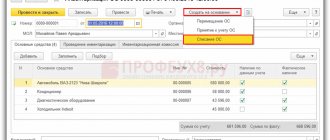Certain nuances of conducting internal audits
Participation of all persons in an internal audit can be exclusively voluntary - the employer is obliged to obtain their written consent
. During the inspection, a psychophysiological examination - the use of a polygraph - can also be carried out with written consent. It is not prohibited to involve third parties on a contractual basis in conducting inspections.
If an internal investigation has revealed the presence of signs of a criminal offense, all information regarding this investigation must be provided to the internal affairs authorities by decision of the employer.
An important fact is that an internal investigation cannot include activities related to the life of an employee suspected of committing an offense outside the enterprise or outside the performance of work duties.
Conducting an internal audit is not mandatory for either the employer or the employees, but it can be a decisive factor in subsequent legal proceedings regarding the application or non-application of disciplinary sanctions to the employee, in particular termination of employment relationships and dismissal at the initiative of the employer.
At any enterprise, sooner or later something happens that requires an internal investigation to establish the causes and culprits. Therefore, it is very important to know how and in what cases it is carried out, as well as how its results are presented.
The concept of an internal investigation
During this process, a commission gathers, identifies all the circumstances, and then adopts an act of official investigation. At the same time, the very concept of “internal investigation” does not exist in domestic legislation, and therefore it is usually conducted according to the rules of disciplinary proceedings, and the details in each organization are worked out at the level of internal rules.
Actually, the investigation itself will be an internal event, that is, the punishment will be of a working nature. If we are talking about more serious violations, then government agencies will take care of the matter.
An official investigation involves the exclusively voluntary participation of an employee, which means that it is prohibited to force him, for example, to undergo a lie detector test or a forced search.
When is it carried out?
For minor violations it is usually not carried out - a conversation with the offender is enough. It is initiated if the violation is serious, and the employee either refuses to acknowledge it at all, or does not recognize all the important circumstances, which makes it necessary to clarify them.
The types of violations that require an investigation are determined by the employers themselves. Usually the list contains violations of labor regulations, job descriptions, safety regulations, failure to perform a job function, and damage to the company.
All these violations can also be divided into two main categories: disciplinary offenses and causing damage. Let's take a closer look at them.
Disciplinary offense
Usually no investigation is carried out into them, but if the misconduct should entail punishment - for example, dismissal, while the employee himself does not admit that he committed it, then an investigation will be necessary. This type of misconduct primarily includes truancy.
Avoidance of medical examination, training, etc. may also be investigated.
Causing damage
If the actions of an employee caused serious damage to the company, it is also necessary to conduct an investigation into this case in order to establish the extent of the damage and determine whether the employee is guilty, and if it was he who allowed or caused the damage, then what punishment should be incurred. The damage can be either direct or, for example, caused as a result of a leak of a trade secret, which is why it is necessary to involve a commission in order to accurately establish all the accompanying circumstances.
Sometimes the actions of the offender may be more serious, even falling under articles of the Criminal Code, for example, theft. In this case, the employer should not continue the investigation on its own, but is instructed to contact law enforcement instead. The company does not have any authority to conduct an investigation on its own in such cases, even if it has its own security service.
Organization of the investigation
How disciplinary sanctions are applied is established by Article 193 of the Labor Code. It is on this that one must rely when it is necessary to organize an investigation.
Let's first look at the general structure of decision making. It will differ for disciplinary offenses and damages.
Expert opinion
Kozlov Andrey Kirillovich
Lawyer with 10 years of experience. Specialization: criminal law. More than 3 years of experience in developing legal documentation.
Let's start with a disciplinary offense: after it is discovered, the employer must provide the employee with the opportunity to explain himself in writing. The employee is given two days to complete the explanation.
If he refuses, it will be necessary to issue a certificate of refusal.
Then the employer decides what sanctions to apply based on the employee’s explanations, reports from his manager, and other documents. Based on them, he issues an order to impose a certain penalty.
A direct internal investigation here will mean the collection of documents indicating:
- the fact of committing an offense;
- the degree of guilt of the employee in it;
- circumstances of the commission that influence the determination of the penalty.
If an employee causes damage, the action algorithm will be as follows:
- by order of the employer, a commission is created that includes at least three employees of the enterprise;
- it reveals the details of the violation;
- it is determined what punishment the offender should suffer.
This is what will be called an official investigation in this case. With its help, it is revealed for what reasons the damage was caused, as well as its extent, and it is determined what the degree of guilt of the employee against whom the proceedings are being carried out is determined. Next, we will consider exactly this option, that is, a full-fledged investigation with a commission.
In both cases discussed above, the employer is responsible for clarifying all the circumstances before determining the punishment. It is necessary that they be supported by documents, because the punished employee can go to court, and he will have to confirm his position.
And if the punishment is not clearly justified, and the employee’s guilt is proven, then the court will make a decision in his favor.
Order of conduct
Let's consider the stages preceding the start of the investigation, as well as the stages of its implementation:
- The fact that a violation has been committed is revealed - any employee of the company can do this, and the day of detection will be taken as the day on which the employee reported the violation to the manager to whom the guilty employee reports.
- The violation is recorded in a report addressed to the boss.
- After reviewing the note, the boss decides to begin an investigation (or transfers the document to a higher-ranking official if he does not have the appropriate authority).
At this point, the stages preceding the investigation end, and the process itself begins:
- The commission is formed by order - we note that the immediate supervisor of the person being inspected is not included in its composition. Just like the manager who will make the final decision.
- The commission is conducting an investigation - during its course it is necessary to find out what the violation was, who committed it, what were the reasons and circumstances, and the amount of damage caused. To do this, an explanatory note is taken from the guilty person, and if it is not identified, then from all possible culprits, then documents are collected to clarify the circumstances.
- A final report is drawn up, detailing the progress of the inspection and its conclusion. The commission's goals often include developing measures to prevent similar damage in the future. The members of the commission certify the act with their signatures, and the head puts a stamp on it.
Let's consider some important nuances - the form of the memo, the execution of the act of giving evidence, the composition of the commission.
Service memo
It is this that becomes the basis for conducting an investigation, and from the moment it is accepted and recorded in the document flow log, the time of its beginning will be counted.
The note is drawn up by a company employee; it is submitted to either the immediate supervisor or the head of the entire company. It indicates what kind of violation was noted, as well as all its important circumstances. If the damage was identified by the inventory, then its report is attached to the note.
In addition to the memo, other documents can serve as the basis for an inspection: requests from consumers with information about misconduct, claims from the counterparty, a statement from the employee himself.
Composition and powers of the commission
The security service, if the company has one, conducts an investigation against the employee; in its absence - the personnel department. The commission includes employees from different departments - usually security and personnel, as well as a union representative.
Most often, the composition is limited to just three members, but sometimes the commission may include a larger number of people.
The commission has the right to demand an explanation from each employee who may have been involved in misconduct. This, however, does not mean that employees are obliged to give them.
She can also request any documents and involve third-party specialists in the case. For example, such a need arises if it is necessary to determine whether an employee was drunk during a shift.
It is also acceptable to seek legal, auditing, and engineering assistance.
The creation of a commission is possible even if the company did not suffer damage, but the employee’s actions could lead to it. Sometimes it can be permanent, but more often it is temporary.
Explanatory note and act of refusal
After the employee receives notification of the need to provide a written explanation, he is given two days to complete and submit. If the time has expired and the document has not been completed, this is considered a refusal to cooperate with the verification, which must be documented in writing.
The legislation does not establish a form for this document, as well as for the employee’s explanation, therefore the registration is free. First of all, it is important to have the signatures of the commission members. An explanatory note or an act of renunciation must be filed in the file.
Preparing for a desk audit: what to pay attention to?
How is the desk audit carried out? What documents need to be submitted? When is the inspection carried out and how does it end? Read about this and much more in the article by Ekaterina Toshcheva, senior consultant economist.
All companies and every individual entrepreneur face a desk audit, regardless of the chosen taxation system, the presence of a loss, or profitability indicators. The inspectorate conducts such checks regularly on the basis of submitted declarations and documents received from taxpayers.
Taxpayers will not be notified about the start of the desk audit procedure. The verification will begin automatically based on the submitted declaration/calculation[1]. You will understand that an in-depth desk audit is being carried out against you when the inspection requires you to submit documents and asks for clarification. And here the tax authority does not violate the current law, because there are no provisions of the Tax Code obliging to inform that they will conduct an in-depth audit of reporting.
Taxpayer rights during an audit
Violations of taxpayers' rights often occur during the audit process. To prevent this from happening, remember your rights.
- The right to inspection within the framework of the submitted reports . As stated in paragraph 1 of Article 88[2] of the Tax Code of the Russian Federation, within the framework of this audit, the tax for which the declaration is submitted is checked, and only for the period specified in this reporting.
If the tax authorities decide to hold you accountable for a tax or period that is not reflected in the audited return, then feel free to go to court. There are several examples of positive decisions: Resolutions of the Federal Antimonopoly Service of the Ural District dated October 21, 2008 No. Ф09-7599/08-С2[3], Federal Antimonopoly Service of the East Siberian District dated August 27, 2007 No. А58-6343/06-Ф02-5686/07[4] .
- The right to be informed about identified errors and provide explanations. When conducting a desk audit, payers have the right[5]:
1) receive from the tax inspectorate information about detected errors contained in the reporting, inconsistencies between the information available to the regulatory authorities and the information sent by those being audited.
The fact that the inspectors did not inform the taxpayer about the detected errors can be accepted in court as another evidence in your favor (Resolution[6] of the Federal Antimonopoly Service of the Moscow District dated March 23, 2006 No. KA-A40/2122-06).
2) provide explanations for detected errors, contradictions and (or) inconsistencies.
There is no need to ignore your right to send explanations and additional documents. If you clarify the situation when calculating tax, then claims from tax authorities will be insignificant. And, accordingly, fines can be avoided.
If the taxpayer agrees with the inspectorate’s comments, he has the right not to send explanations, but to submit an updated declaration.
Let's consider this situation. During the desk inspection, the inspector discovered errors and called by phone to demand clarification. Should the organization respond to verbal demands from inspection staff?
The Tax Code does not directly answer the question of the form in which a message is sent to the taxpayer about errors identified during a desk audit. To draw up a desk audit report, the tax authority must follow this process. Therefore, in practice, information about errors is sent to the taxpayer in writing.
Thus, taxpayers are obliged to comply only with the legal requirements of the tax authorities, while the legislation does not provide for the implementation of oral instructions from department employees.
- The right to comply with inspection deadlines . In the process of conducting a desk audit, inspectors are required to adhere to the restrictions on the inspection period established by the Tax Code of the Russian Federation. The inspection cannot last more than three months from the date of submission of the report (clause 2 of Article 88[7] of the Tax Code of the Russian Federation).
The inspection does not always comply with this restriction.
But a disappointing conclusion follows from paragraph 14 of Article 101[8] of the Tax Code of the Russian Federation: violation of this deadline is not a reason to cancel the decision based on the results of this audit.
You also have the right to provide an updated tax return during the audit[9], the right to maintain order during tax control procedures, the right to receive a report drawn up upon completion of the audit[10], the right to study audit data[11], etc. d.
Deadlines for conducting a desk audit
Everything is simple here. The period for holding a chamber meeting on value added tax is two months, for other taxes – three.
This period cannot be extended, but there is one exception. It's in every rule. Tax officers have the right to extend the period for conducting a desk audit on VAT, that is, the audit will already last three months. But this is only possible if non-compliance with the norms of the current tax legislation is revealed[12].
The verification period begins to run from the next day after the day of reporting [13].
The end date in general is the corresponding date in three months. For example, the inspection received the report on August 1. Therefore, the last day of verification will be November 1st.
Have the deadlines for conducting a desk tax audit changed due to the unfavorable epidemiological situation in the country? After all, there were many changes: tax payment deadlines for some companies were postponed, bans on inspections were introduced during this difficult time. Desk inspections are carried out within generally established time frames without any extensions. This is indicated by the interpretations of the departments[14].
What documents need to be submitted?
During a desk audit, inspectors may request additional documents only in cases established by the Tax Code of the Russian Federation[15].
For example, you must submit documents if:
- did not submit documents along with the reports, although the Tax Code of the Russian Federation assigned this responsibility to you. Let's say you credited the payment of property tax abroad, but supporting documents were not attached to the declaration[16];
- apply for one or another tax benefit;
- sent VAT reports with tax for refund;
- there are discrepancies in the submitted VAT return or in the counterparty’s return, which led to an underpayment of tax or an overstatement of the refundable VAT;
- took advantage of reduced rates for insurance premiums or indicated non-taxable payments in the reporting. You may be asked for documents that confirm them;
- submitted updated reports if two years have passed from the submission of the initial reports and in which the tax was reduced or the loss was increased;
- took advantage of tax deductions under the tax free system;
- claim an investment income tax deduction.
You can also submit documents on your own initiative if you know that the inspectors will request them anyway.
As part of a desk audit, inspectorate employees have the right to carry out a wide range of tax control activities. But they resort to them less often than, say, during an on-site inspection.
In practice, during a desk audit, inspectors:
- request documents from the company. It has the right only in the cases discussed above;
- request documents and information from counterparties, the so-called counter check[17];
- they are summoned to the inspectorate for questioning and asked to provide explanations. Please note that there is liability for ignoring a call to the tax office. Also, due to the unfavorable epidemiological situation, the period for providing explanations during the verification process of the VAT return was increased by 10 days. But this only applies to claims received from March 1 to June 30 inclusive. The basis for this is paragraph [18] of the Decree of the Government of the Russian Federation dated 04.2020 No. 409;
- conduct an inspection of the territory of the inspected person. But such cases are limited[19].
Registration of desk audit results
The presentation of the results of the inspection depends on whether violations are identified or not.
If violations are found, the inspectors must draw up a report within 10 working days after the end of the inspection[20]. If you do not agree with the conclusion described therein, then you have the opportunity to submit objections. To do this, the payer has one month (clause 6 of Article 100 of the Tax Code of the Russian Federation[21]).
Ultimately, the inspectors make a final decision.
If you have not violated the law, then the inspectors do not register the results of the inspection. The Tax Code does not provide for the execution of any document in this case.
Taxpayer liability
Liability may arise in the event of refusal to submit or untimely submission of documents requested by inspections. The fine in this case will be 200 rubles for each document that you refused to send (clause 1 of Article 126 of the Tax Code of the Russian Federation[22]).
Also, officials of the organization may be held administratively liable for this violation. And this is a fine, the amount of which varies from 300 to 500 rubles (Part 1 of Article 15.6 of the Code of Administrative Offenses of the Russian Federation[23]).
Payers who fail to provide explanations within the time period specified by the inspection are also held liable. You will have to pay 5,000 rubles. If the violation is repeated within a year, the fine will be 20,000 rubles (Article 129.1 of the Tax Code of the Russian Federation[24]).
In case of failure to provide documents and explanations, there is a risk of inclusion in the plan of on-site tax audits.
Be careful to provide explanations only for the TKS if you are required to submit a VAT return electronically. Having sent explanations on paper, they will be regarded as not submitted (paragraph 4, paragraph 3, article 88 of the Tax Code of the Russian Federation[25]).
For reference
The regulations for conducting a desk tax audit are determined by Article 88 of the Tax Code of the Russian Federation[26].
This type of audit is carried out on the territory of the inspection itself, without visiting taxpayers. This does not cause inconvenience for taxpayers; they continue to conduct their financial and economic activities.
When conducting a desk audit, department employees rely on articles of the Tax Code of the Russian Federation. Also used:
- recommendations for conducting desk audits[27];
- letters[28] of the Federal Tax Service of Russia, which are necessary for use by lower tax authorities.
So, a desk audit begins after the submission of any declaration or calculation. Can an inspection be carried out without submitting a declaration? No, here the actions of the inspectors will be illegal. After all, the camera room begins only after the reporting is submitted. This is directly indicated by paragraph 1 of Article 88 of the Tax Code of the Russian Federation[29].
If the inspectorate does not have the submitted reports, it has the right to conduct another type of tax control, but not a desk audit[30]. But please note : there is an exception to every rule. For example, if a foreign company, which is subject to registration in accordance with paragraph 4.6 of Article 83 of the Tax Code of the Russian Federation[31], has not sent a declaration (calculation) on the scheduled date, inspectors have the right to conduct a desk audit based on the data they have, as well as data on other similar taxpayers.
To ensure that the desk audit is completed with minimal complaints from the tax authorities, know your rights and responsibilities during the audit.
[1] Art. 88 of the Tax Code of the Russian Federation (part one) dated July 31, 1998 No. 146-FZ (as amended on July 20, 2020) {ConsultantPlus}.
[2] Art. 88 of the Tax Code of the Russian Federation (part one)” dated July 31, 1998 No. 146-FZ (as amended on July 20, 2020) {ConsultantPlus}.
[3] Resolution of the Federal Antimonopoly Service of the Ural District dated October 21, 2008 No. F09-7599/08-S2 in case No. A76-4251/08 {ConsultantPlus}.
[4] Resolution of the Federal Antimonopoly Service of the East Siberian District dated August 27, 2007 No. A58-6343/06-F02-5686/07 in case No. A58-6343/06 {ConsultantPlus}.
[5] Art. 88 of the Tax Code of the Russian Federation (part one) dated July 31, 1998 No. 146-FZ (as amended on July 20, 2020) {ConsultantPlus}.
[6] Resolution of the Federal Antimonopoly Service of the Moscow District dated March 23, 2006 No. KA-A40/2122-06 in case No. A40-45824/05-126-392 {ConsultantPlus}.
[7] Art. 88 of the Tax Code of the Russian Federation (part one) dated July 31, 1998 No. 146-FZ (as amended on July 20, 2020) {ConsultantPlus}.
[8] Art. 101 of the Tax Code of the Russian Federation (part one) dated July 31, 1998 No. 146-FZ (as amended on July 20, 2020) {ConsultantPlus}.
[9] Art. 88 of the Tax Code of the Russian Federation (part one) dated July 31, 1998 No. 146-FZ (as amended on July 20, 2020) {ConsultantPlus}.
[10] Art. 100 of the Tax Code of the Russian Federation (part one) dated July 31, 1998 No. 146-FZ (as amended on July 20, 2020) {ConsultantPlus}.
[11] Art. 101 of the Tax Code of the Russian Federation (part one) dated July 31, 1998 No. 146-FZ (as amended on July 20, 2020) {ConsultantPlus}.
[12] Art. 88 of the Tax Code of the Russian Federation (part one) dated July 31, 1998 No. 146-FZ (as amended on July 20, 2020) {ConsultantPlus}.
[13] Art. 6.1 Tax Code of the Russian Federation (part one) dated July 31, 1998 No. 146-FZ (as amended on July 20, 2020) {ConsultantPlus}.
[14] Question: About the deadlines for submitting explanations and documents (information) to the requirements of the tax authority in the context of the spread of coronavirus infection (Letter of the Federal Tax Service of Russia dated May 22, 2020 No. EA-4-15/8424) {ConsultantPlus}.
[15] Art. 88 of the Tax Code of the Russian Federation (part one) dated July 31, 1998 No. 146-FZ (as amended on July 20, 2020) {ConsultantPlus}.
[16] Art. 386.1 of the Tax Code of the Russian Federation (part two) dated 08/05/2000 No. 117-FZ (as amended on 07/31/2020) {ConsultantPlus}.
[17] Article 93.1 of the Tax Code of the Russian Federation (part one) dated July 31, 1998 No. 146-FZ (as amended on July 20, 2020) {ConsultantPlus}.
[18] Decree of the Government of the Russian Federation dated 04/02/2020 No. 409 (as amended on 07/11/2020) “On measures to ensure sustainable economic development” (together with the Rules for the provision of deferrals (installment plans) for the payment of taxes, advance payments of taxes and insurance premiums) {Consultant Plus}.
[19] Art. 92 of the Tax Code of the Russian Federation (part one) dated July 31, 1998 No. 146-FZ (as amended on July 20, 2020) {ConsultantPlus}.
[20] Art. 88 of the Tax Code of the Russian Federation (part one) dated July 31, 1998 No. 146-FZ (as amended on July 20, 2020) {ConsultantPlus}.
[21] Art. 100 of the Tax Code of the Russian Federation (part one) dated July 31, 1998 No. 146-FZ (as amended on July 20, 2020) {ConsultantPlus}.
[22] Art. 126 of the Tax Code of the Russian Federation (part one) dated July 31, 1998 No. 146-FZ (as amended on July 20, 2020) {ConsultantPlus}.
[23] Art. 15.6 Code of Administrative Offenses of the Russian Federation dated December 30, 2001 No. 195-FZ (as amended on July 31, 2020) {ConsultantPlus}.
[24] Art. 129.1 of the Tax Code of the Russian Federation (part one) dated July 31, 1998 No. 146-FZ (as amended on July 20, 2020) {ConsultantPlus}.
[25] Art. 88 of the Tax Code of the Russian Federation (part one) dated July 31, 1998 No. 146-FZ (as amended on July 20, 2020) {ConsultantPlus}.
[26] Art. 88 of the Tax Code of the Russian Federation (part one) dated July 31, 1998 No. 146-FZ (as amended on July 20, 2020) {ConsultantPlus}.
[27] Letter of the Federal Tax Service of Russia dated July 16, 2013 No. AS-4-2/12705 (as amended on February 13, 2020) “On recommendations for conducting desk tax audits” {ConsultantPlus}.
[28] Letter of the Federal Tax Service of Russia dated July 27, 2018 No. ММВ-20-15/ [email protected] “On reducing the period of desk audit” {ConsultantPlus}.
[29] Art. 88 of the Tax Code of the Russian Federation (part one) dated July 31, 1998 No. 146-FZ (as amended on July 20, 2020) {ConsultantPlus}.
[30] Art. 82 of the Tax Code of the Russian Federation (part one) dated July 31, 1998 No. 146-FZ (as amended on July 20, 2020) {ConsultantPlus}.
[31] Art. 83 of the Tax Code of the Russian Federation (part one) dated July 31, 1998 No. 146-FZ (as amended on July 20, 2020) {ConsultantPlus}.
Deadlines
The legislation sets a clear limit on the period during which a case can be investigated - a month, and before its expiration the results must be presented. The countdown begins from the day the order to begin the investigation is issued, or from the date of filing the memo, if the inspection begins on its basis.
But it should be noted that this period should not include the time when the employee is absent, on vacation or on sick leave, as well as the time required to take into account the opinion of the employees’ representative body. This unaccounted time must not exceed 6 months in total.
After the expiration of six months, the opportunity to apply a disciplinary sanction disappears, except for punishment for violations identified by an audit or audit - in relation to this, this period is up to 2 years.
Procedure
The on-site inspection begins on the day the decision is made. According to current legislation, the inspectorate is not obliged to warn the taxpayer in advance about planned actions. The inspection notice is served in any convenient way - in person, by telephone, via TCS or sent by mail.
After receiving the notification, the taxpayer is given 10 days to collect documentation for inspection and transfer it to Federal Tax Service inspectors. If the volume of documents collected is significant enough, it is possible to file a petition to extend the deadline. The tax office must make a decision on this matter within 2 days. However, in such situations, inspectors act at their own discretion. The request may be refused.
The object of an on-site tax audit is the correctness of the calculation of taxes and insurance premiums. Federal Tax Service inspectors should not be interested in other matters of an organization or entrepreneur not related to taxation, except for the following situations:
- the subject being inspected works in the field of regional investment projects;
- the taxpayer uses a special tax regime, the right to apply which will need to be proven.
Conducting an on-site tax audit is accompanied by a number of restrictions, including:
- the depth of the audit cannot exceed 3 previous reporting periods;
- verification is carried out no more than 2 times a year, repeated verification of the same documents is not allowed;
- activities are carried out at the address of the actual location of the payer or on the territory of the tax office.
The actions of inspectors within the framework of an on-site inspection allow for the following procedures:
- Inspection of the taxpayer’s premises, regardless of their location. We are talking about warehouse, office, retail and other areas.
- Request for documentation necessary to verify the activities of the person being inspected. Inspectors request an initial package of documents to obtain information at the beginning of the inspection. Further, additional requests for clarification are received as necessary.
- Inventory of company assets. An examination of the material assets available to the subject and used in business activities is carried out.
- Witness interviews. Hired employees of the person being inspected may be called upon. Inspectors also have the right to contact other witnesses to obtain the necessary information.
- Conducting an examination and obtaining an expert opinion. Third-party specialists may be involved in assessing the current situation additionally on a contractual basis.
- Engaging a translator. If necessary, tax authorities have the right to use the services of translators to obtain a complete picture of the state of the financial affairs of the person being inspected.
- Removal of documents. The seized documents serve as evidence of the detected tax offense.
As part of an on-site tax audit, inspectors seek complete information on the following issues:
- compliance with the law when registering the person being inspected;
- accounting documents are checked in order to reconcile the actual tax base with the declared one;
- the completeness and timeliness of payment of taxes and contributions is analyzed;
- errors, inaccuracies and distortions identified during the audit that affect the correctness of tax calculations are recorded.
In addition to identifying ordinary arithmetic errors in calculations, tax inspectors pay attention to the compliance of filling out documents with legal requirements. The absence of any mandatory details may be grounds for recognizing the available information as unconfirmed, which may have a negative impact on the tax base.
Appeal procedure
The enterprise may have various procedures for appealing the results of the investigation; what these procedures will be is established by local regulations. This issue is not regulated by law; as we have already mentioned, there is no such thing as an official investigation, much less the nuances of appealing it.
But what can be appealed is the decision made by the employer - in the labor inspectorate or directly in court. In this case, he will have to provide the documents collected during the investigation to prove that the violation was in fact committed, and by the same person who was punished, and the severity level corresponds to the violation.
Decision of the tax authority based on the results of the audit
The act has been drawn up and objections have been filed. What's next? And then - the procedure for considering inspection materials, provided for in Art. 101 Tax Code of the Russian Federation.
This article talks about some of its controversial aspects.
It is carried out by the head of the Federal Tax Service Inspectorate or his deputy.
Note! Tax authorities are required to notify you of the time and place of the review. Moreover, they must do this within a reasonable time frame so that you have a real opportunity to attend.
Read more here.
The result of reviewing the materials will be the final decision on the inspection. Controllers will indicate whether there were violations or not, and decide whether or not to hold you accountable. This is already a binding document, as opposed to an act.
You will learn from this publication whether to execute the decision if the inspection did not deliver it within the established time frame.
Before making a decision, you can familiarize yourself with all the inspection materials and even copy them.
See more about this here.
This will help you be better prepared for future appeals.
Registration of results
The document that should summarize the results is an official investigation report - we attach a sample of it to the article, and here we will briefly consider the content.
This document consists of three parts:
- introductory;
- descriptive;
- resolutive.
The introductory note states what kind of violation we are talking about, indicates the date of commission, the composition of the commission, and the period during which the investigation was conducted. The narrative goes deeper into the evidence on which the commission came to its conclusions. Finally, the resolution sums up the conclusion - the commission draws conclusions regarding the employee’s guilt.
Then follow the appendices, that is, documents such as memos, explanatory notes, inventory acts, if we are talking about shortages, expert opinions and the like. It is necessary that each member of the commission signs the act, and the head affixes a seal.
Then the case is assigned a number and the date when it was compiled is indicated - this is also the date the investigation was completed.
If one of the commission members has an opinion different from that stated in the document, he must still sign, but can state his position separately and attach this statement to other materials.
After this, the manager is given three days to make a decision, which must be issued in the form of an order. The manager is obliged to focus on the instructions of the commission, however, he can usually choose the desired collection option from those allowed by law.
The employee must be familiarized with the order - 3 working days are allotted for this after its publication. If the employee refuses to familiarize himself with the document, a statement of refusal is drawn up.
As practice shows, production activities at any enterprise can be accompanied by various disciplinary violations on the part of employees. If such an offense is of a serious nature, entailing serious consequences, the company must organize a special internal audit (investigation) in order to identify the guilty parties and apply fair punishment.
Registration of desk tax audit results
So, KNI is carried out in relation to all declarations received by the tax authorities. If everything in the declaration is in order, for the taxpayer the audit proceeds quietly and unnoticed: no decision is made to start it, and no documents are drawn up based on its results (except for the KNI for VAT refund).
The situation is different when inspectors identify violations. In this case, upon completion of the inspection, they are required to draw up a report.
Read more about what it should contain, what it looks like and what the consequences of not having it compiled are in this article.
Note! The progress of the desk audit can be influenced by submitting clarifications. This is important for those who themselves have discovered errors in a declaration that has already been submitted.
Read about how to use clarifications wisely and what you can argue with the tax authorities in the following articles:
- “A clarification submitted after the delivery of the KNP act will not prevent a decision on it”;
- “When making a decision on an inspection, inspectors must take into account the “clarifications” submitted before its adoption.”
Another important clarification: the inspection report is essentially an informational document. By itself, it does not give rise to any consequences for the person being audited, but only informs that during the audit certain facts were discovered that may indicate that the taxpayer committed violations. This means that you cannot appeal what is stated in the act yet. At the same time, you have the opportunity to influence the review decision by filing objections.
Read about how they are designed in this publication. There is also a ready-made sample of objections to the KNP act.
The entire subsequent procedure and actions with the camera report are similar to those provided for on-site inspection reports. We'll talk about them further.
The concept of internal audit, its legal regulation
An internal audit is understood as a special type of investigation carried out within the framework of the production process of a particular enterprise, during which the guilty person and the degree of his guilt are determined, as well as the details of the offense are revealed.
Often such investigations are typical for government agencies. However, managers of commercial entities also have the right to organize internal inspections within their enterprises, if there are appropriate grounds for this.
Expert opinion
Kozlov Andrey Kirillovich
Lawyer with 10 years of experience. Specialization: criminal law. More than 3 years of experience in developing legal documentation.
Practice shows that this is typical for large companies. At the same time, the local regulations of the organization must reflect the rules, taking into account which the investigation will be carried out.
In turn, Federal Law No. 79 dated June 26, 2017, which contains all the features and nuances of implementing such an event, is relevant for government agencies.
For the structures of the Ministry of Internal Affairs of the Russian Federation, Order of the Ministry of Internal Affairs No. 161 of March 26, 2013 is valid.
In addition, a complete picture regarding the conduct of an internal audit is drawn up on the basis of various articles of the labor legislation of the Russian Federation. So, for example, in Art. 193 of the Labor Code of the Russian Federation clearly states the procedure for applying disciplinary sanctions. It is in the event of a serious disciplinary offense that an internal investigation may be initiated in the future.
There are a number of general principles on which an internal audit should be based:
- all facts revealed during the investigation must be assessed objectively and impartially. Personal emotional attitude towards a particular phenomenon should not influence the decision of the manager, commission representative or the accused;
- Until the subject is proven guilty, he is innocent. Guilt is established only upon identification of obvious and irrefutable evidence;
- The procedure for the actions of commission members must strictly comply with the regulations defined in local regulations. Otherwise, such actions may be regarded as illegal.
Formation of an act based on the results of an on-site tax audit
The on-site tax audit report is the final document drawn up on the basis of the activities carried out by the Federal Tax Service inspectors. It reflects the results of the audit, including identified tax violations. Considering that in the vast majority of cases, any errors in accounting are discovered, the amount of additional charges and fines is prescribed in the act.
Immediately after completing the inspection, inspectors issue the person being inspected with a certificate of completion of the work. The final report is provided to the taxpayer no later than 2 months from the date of completion of the activities.
After the formation of the on-site audit report, it is handed over to the taxpayer against signature. If you evade receipt, the document is sent by mail. It is not allowed to make unilateral changes to the act after it has been delivered. However, technical adjustments may be made in agreement with the person being inspected.
Grounds for conducting an internal audit
An official investigation must be based on solid grounds. In particular, the reasons for organizing an internal audit include :
- misconduct committed by a person that entails dismissal. This, for example, is true for administrative persons who have made some unfounded management decision that resulted in large financial losses. The reasons for the dismissal of employees are described in more detail in Art. 81 Labor Code of the Russian Federation;
- violation of the rules for drawing up an employment agreement specified in Art. 84 TC, when drawing up a document. For example, the stated duties of an employee in an employment contract do not correspond to the actual qualifications of the person and, accordingly, cannot be performed by him;
- the occurrence of all circumstances specified in legislative regulations in which an internal audit is inevitable. For example, such an event should be carried out in case of accidents at work, etc.
The procedure for processing the results of a tax audit
The procedure for processing the results of a tax audit depends on 2 factors:
- type of inspection: desk or field;
- the actual result of the check: whether there are violations or not.
The entire resulting procedure is clearly stated in Art. 100 Tax Code of the Russian Federation.
Find the full text of the article, as well as comments on the main issues raised by its provisions, here.
Now let's briefly look at the main aspects.
The main tasks of organizing an internal audit
Since an internal audit is carried out only if there are compelling reasons, it must pursue specific goals. In particular, the main objectives of such an event include :
determination of the fact of committing an offense, which entails the imposition of appropriate disciplinary sanctions;
- establishing the specific time and circumstances of the commission of the offense, analyzing the incident, its consequences and identifying the amount of damage caused;
- determination of the guilty person, collection and systematization of a number of evidence regarding his direct guilt or non-involvement in the incident;
- establishing the degree of guilt of the employee;
- analysis of the nuances and features of what happened, identifying the special motives of the person.
The procedure for conducting an internal audit
First, you need to determine the frequency of the internal audit. This is required because the legal time available for imposing disciplinary action is not increased by the investigation.
Therefore, verification and determination of punishment must be carried out within the established period - one calendar month from the moment the offense was discovered. Direct enforcement of the chosen measure of responsibility, in turn, should not be carried out later than 6 months from this date.
If an internal review is not due to a disciplinary violation by an employee, it is recommended that it be carried out as soon as possible, but no exact time frame is specified.
The internal audit is carried out on the basis of the manager's order . It must reflect the following information :
- business powers of commission members and other responsible persons;
- frequency of internal inspections;
- the procedure for documenting the results of the event.
The internal audit must be completed no later than the deadlines specified above. Upon its completion, representatives of the commission generate relevant documents.
Registration of the results of an on-site tax audit
Based on the results of an on-site inspection, a report is always drawn up, regardless of whether violations were discovered or not. However, the completion of the inspection is not recorded there, but in the certificate of the completed GNP. It is from the date of its preparation that the period allotted for the execution of the act begins.
This article talks about who, when and how it is drawn up.
Just as with the cameral, in case of disagreement with the tax authorities, you can file objections to the on-site inspection report.
This article will help you create them.
However, an act without comments, which seems to mean that you are doing everything correctly, is not a guarantee against sanctions in the future.
Surprised? Read this publication and find out what we mean.
Rights and obligations of commission members during an internal audit
The powers of the commission members are as follows:
- request explanations from any company employees regarding what happened and any other information;
- document the received evidence in writing;
- review company documentation that is relevant to the ongoing investigation. In addition, all documents that the commission representatives deem relevant may be included in the investigation materials;
- with the consent of the employer, involve specialists of narrow profiles in the investigation, request the required information from government and private structures and attach such documents to the case file.
The responsibilities of commission representatives include:
- carrying out various activities during an internal audit to establish the circumstances of the incident and the perpetrators;
- consideration and taking into account statements received in the framework of an ongoing case;
- ensuring the confidentiality of information obtained during the verification process;
- proper presentation of inspection results.
In turn, the rights of an allegedly guilty employee include:
- expressing in writing your view of the situation;
- putting forward demands for members of the commission to include in the materials of the internal audit papers and other data supporting the position of the employee who committed the offense;
- the right to be informed about the information collected by the commission during the investigation.
Consequently, the allegedly guilty person has the right to defend his views and provide documentary evidence of his innocence.











